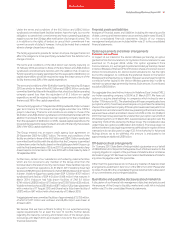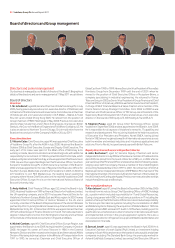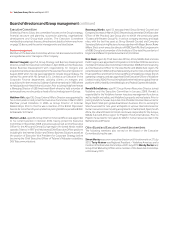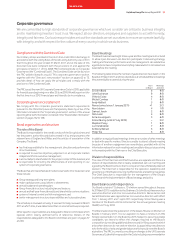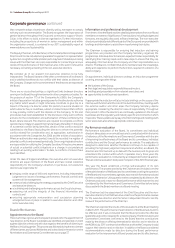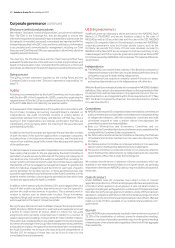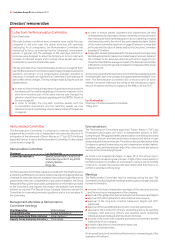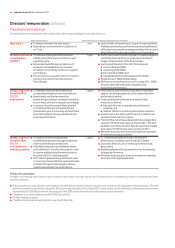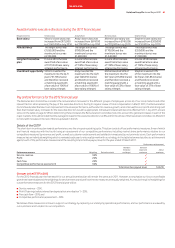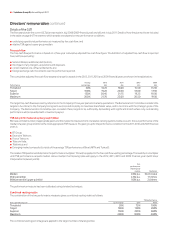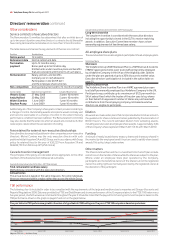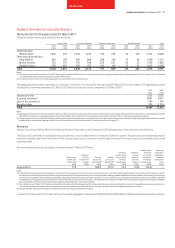Vodafone 2011 Annual Report Download - page 63
Download and view the complete annual report
Please find page 63 of the 2011 Vodafone annual report below. You can navigate through the pages in the report by either clicking on the pages listed below, or by using the keyword search tool below to find specific information within the annual report.
Vodafone Group Plc Annual Report 2011 61
Governance
■ The concept of a related party for the purposes of NASDAQ’s listing rules
differs in certain respects from the definition of a transaction with a
related party under the Listing Rules.
Shareholder approval
■ NASDAQ requires shareholder approval for certain transactions involving
the sale or issuance by a listed company of share capital.
■ Under the NASDAQ rules, whether shareholder approval is required for
such transactions depends on, among other things, the number of shares
to be issued or sold in connection with a transaction, while we are bound
by the provisions of the Listing Rules which state that shareholder
approval is required, among other things, when the size of a transaction
exceeds a certain percentage of the size of the listed company
undertaking the transaction.
■ In accordance with our articles of association we also seek shareholder
approval annually for issuing shares and to dis-apply the pre-emption rights
that apply under law in line with limit guidelines issued by investor bodies.
Related party transactions
■ The NASDAQ rules require companies to conduct appropriate reviews of
related party transactions and potential conflicts of interest via the
company’s audit committee or other independent body of the board
of directors.
■ We are subject to extensive provisions under the Listing Rules issued by
the FSA in the UK (the “Listing Rules”) governing transactions with related
parties, as defined therein, and the Companies Act 2006 also restricts the
extent to which companies incorporated in England and Wales may enter
into related party transactions.
■ Our articles of association contain provisions regarding disclosure of
interests by our directors and restrictions on their votes in circumstances
involving conflicts of interest.
■ In lieu of obtaining an independent review of related party transactions
for conflicts of interests, but in accordance with the Listing Rules, the
Companies Act 2006 and our articles of association, we seek shareholder
approval for related party transactions that meet certain financial
thresholds or where transactions have unusual features.
Report from the Audit Committee
The Audit Committee assists the Board in carrying out its responsibilities
in relation to financial reporting requirements, risk management and the
assessment of internal controls. The Audit Committee also reviews the
effectiveness of the Company’s internal audit function and manages the
Company’s relationship with the external auditor. For further details, its
terms of reference can be found on the Vodafone website (www.vodafone.
com/governance).
The Audit Committee is composed of independent, non-executive
directors selected to provide the wide range of financial and commercial
expertise necessary to fulfil the Committee’s duties. The membership of
the Committee is set out in the table on page 57. By invitation of the
Chairman of the Audit Committee, the Chief Executive, the Chief Financial
Officer, the Group Financial Controller, the Director of Financial Reporting,
the Group Audit Director and the external auditor also attend the Audit
Committee meetings. Relevant people from the business are also invited
to attend certain meetings in order to provide insight and enhance the
Audit Committee’s awareness of key issues and developments in the
business which are relevant to the Audit Committee in the performance
of its role.
During the year ended 31 March 2011 the principal activities of the Audit
Committee were as follows:
Financial reporting
The Audit Committee reviewed and discussed with management and the
external auditor the half-year and annual financial statements focusing on,
amongst other matters:
■ the quality and acceptability of accounting policies and practices;
■ the clarity of the disclosures and compliance with financial reporting
standards and relevant financial and governance reporting
requirements; and
■ material areas in which significant judgements have been applied.
To aid their review, the Audit Committee considered reports from the Group
Financial Controller and the Director of Financial Reporting and also reports
from the external auditor, Deloitte LLP, on the scope and outcome of their
half-year review and annual audit.
Risk management and internal control
The Audit Committee reviewed the process by which the Group evaluated
its control environment, its risk assessment process and the way in which
significant business risks were managed. It also considered the Group Audit
Director’s reports on the effectiveness of internal controls, significant
identified frauds and any identified fraud that involved management or
employees with a significant role in internal controls. The Audit Committee
was also responsible for oversight of the Group’s compliance activities in
relation to section 404 of the Sarbanes-Oxley Act.
Internal audit
The Audit Committee monitored and reviewed the scope, extent and
effectiveness of the activity of the Group Internal Audit department and
received reports from the Group Audit Director which included updates
on audit activities, progress of the Group audit plan, the results of any
unsatisfactory audits and the action plans to address these areas, and
resource requirements of the internal audit department. The Audit
Committee held private discussions with the Group Audit Director as
necessary throughout the year.
External auditor
The Audit Committee reviewed and monitored the independence of the
external auditor and the objectivity and effectiveness of the audit process
and provided the Board with its recommendation to the shareholders on
the reappointment of Deloitte LLP as external auditor. The Audit
Committee approved the scope and fees for audit services and, after
consideration of whether they were permissible under the Group’s
policies, non-audit services provided by Deloitte LLP.
Private meetings were held with Deloitte LLP without management being
present to ensure that there were no restrictions on the scope or
independence of their audit.
Audit Committee effectiveness
The Audit Committee conducts a formal review of its effectiveness
annually and concluded that its performance was effective. Details of the
Board and Committee evaluation process can be found under
“Performance evaluation” on page 56.
Nick Land
On behalf of the Audit Committee


